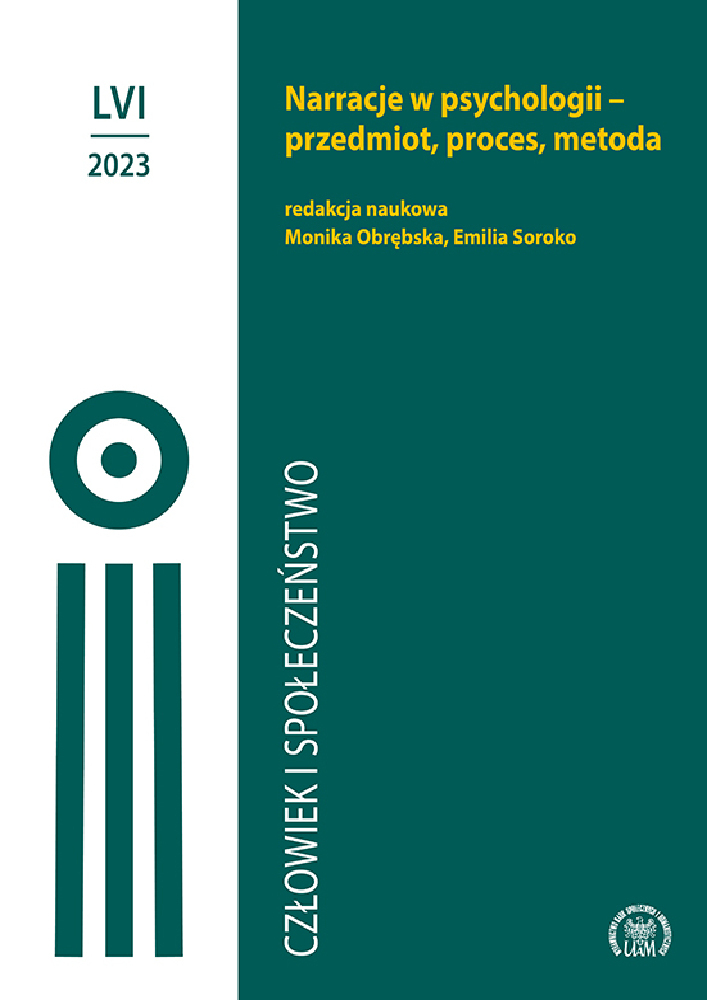Abstrakt
Research about health loss shows that the way we experience critical moments and build a new identity are important in giving meaning to disease. It allow to integrate the experience of illness into the whole of life. The aim of the research was to analyze the narrative identity reflected in the life history and to explore the factors contributing to the differences in the formed narratives. A research question was: what narrative about one’s life does a person with an oncological disease create? The Polish adaptation of Dan McAdams’ life story interview was used. The study was conducted in group of four people with cancer remission. The research material was subjected to McAdams’ proposed sequence and consistency analysis. Elements of hermeneutic analysis were also used. The patients identity is coherent and mature, their narrative include the time from childhood to the present. Narratives differ in the degree of paying attention on the description of emotional experiences, the level of detail and the way of moving to the next stages of the story. Patient include the disease in their narratives, doing so in an individual way. However, it is possible to distinguish two ways of storytelling. One of them is the location of the disease in the broader background of the life situation, the other – recognizing the disease as the main moment in a given part of the story, constituting its title. It seems interesting to perform comparative research in a group of people, who are during diagnosis of cancer and relate them to the results of people in remission stage.
Bibliografia
Adler, M.J. (2012). Living into the Story: Agency and Coherence in a Longitudinal Study of Narrative Identity Development and Mental Health over the Course of Psychotherapy. Journal of Personality and Social Psychology, 102(2), 367–389. DOI: https://doi.org/10.1037/a0025289
Bartosz, B. (2002). Doświadczenie macierzyństwa: analiza narracji autobiograficznych. Wrocław: Wydawnictwo Uniwersytetu Wrocławskiego.
Baszczak, B. (2011). Tożsamość człowieka a pojęcie narracji. Analiza i Egzystencja, 14, 123–140.
Błasiak, A. (2018). Sharenting – współczesną formą rodzicielskiej narracji. Horyzonty Wychowania, 17(42), 125–134.
Budziszewska, M. (2013). Wywiad biograficzny Dana McAdamsa – adaptacja polska i niektóre możliwości interpretacyjne. Przegląd Psychologiczny, 56(3), 347–362.
Jezierski, K. (2010). Zagadnienie tożsamości w ujęciach Dana P. McAdamsa i Erika H. Eriksona. Psychologia Rozwojowa, 15(4), 93–102.
Kieszkowska-Grudny, A., Rucińska, M., Sopel, A., Szmit, M., Kubaj, H., Wilk, O., Ciesak, R. (2015). Poszukiwanie informacji na temat choroby oraz satysfakcja z informacji otrzymanej w grupie chorych na nowotwory hematologiczne i nowotwory lite. Journal of Oncology, 65(4), 281–291. DOI: https://doi.org/10.5603/NJO.2015.0057
Kozaka, J. (2015). Kliniczny przebieg choroby nowotworowej a przystosowanie psychiczne. Curr Gynecol Oncol, 13(1), 27–43. DOI: https://doi.org/10.15557/CGO.2015.0004
Krawczyk-Bocian, A. (2008). Mity o narracji. Od subiektywizmu do problemu interpretacji. Teraźniejszość – Człowiek – Edukacja, 2(42), 37–51.
McAdams, D. (1996). Personality, Modernity, and the Storied Self: A Contemporary Framework for Studying Persons. Psychological Inquiry, 7(4), 295–321. DOI: https://doi.org/10.1207/s15327965pli0704_1
Oleś, P. (2016). Wprowadzenie do psychologii osobowości. Warszawa: Scholar.
Pilarczyk J. (2010). Rola psychoonkologii w leczeniu chorób nowotworowych u dzieci. W: M. Cybulski, W. Strzelecki (red.), Psychologia w naukach medycznych (ss. 44–56). Poznań: Wydawnictwo Naukowe Uniwersytetu Medycznego im. Karola Marcinkowskiego w Poznaniu.
Rosner, K. (2003). Narracja, tożsamość i czas. Kraków: Universitas.
Soroko, E. (2009). Wywoływanie autonarracji w badaniach psychologicznych. Ocena (auto)narracyjności wypowiedzi. Poznań: Wydawnictwo Naukowe UAM.
Walden-Gałuszko, K., de. (2011). Psychoonkologia w praktyce klinicznej. Warszawa: PZWL Wydawnictwo Lekarskie.
Licencja
Prawa autorskie (c) 2023 Gracjana Gronowska, Monika Wiłkość-Dębczyńska

Utwór dostępny jest na licencji Creative Commons Uznanie autorstwa 4.0 Międzynarodowe.
1. W momencie złożenia pracy celem rozpoczęcia postępowania w sprawie publikacji, Licencjodawca, zwany dalej Autorem, akceptuje wszystkie zasady umieszczone na stronie internetowej czasopisma “Człowiek i Społeczeństwo”, udzielając Licencjobiorcy, zwanego dalej Wydawcą, niewyłącznej i nieodpłatnej licencji na korzystanie z Utworu. Licencja zakłada tym samym brak ograniczeń terytorialnych, czasowych oraz ilościowych na następujących polach eksploatacji (art. 50 ustawy z dnia 4 lutego 1994 r. o prawie autorskim i prawach pokrewnych):
a. utrwalanie Utworu;
b. zwielokrotnienie Utworu drukiem i w wersji cyfrowej;
c. wprowadzenie do obrotu, użyczenie lub najem oryginału/zwielokrotnionych egzemplarzy Utworu;
d. publiczne wykonanie, wystawienie, wyświetlenie, odtworzenie oraz nadawanie i reemitowanie, a także publiczne udostępnianie Utworu w taki sposób, aby każdy mógł mieć do niego dostęp w miejscu i w czasie przez siebie wybranym;
e. włączenie Utworu w skład utworu zbiorowego;
f. wprowadzenie Utworu w postaci elektronicznej na platformy elektroniczne lub inne wprowadzenie Utworu w postaci elektronicznej do Internetu, Intranetu, Extranetu lub innej sieci;
g. rozpowszechnianie Utworu w wersji elektronicznej w Internecie, Intranecie, Extranecie lub innej sieci, w pracy zbiorowej, a także samodzielnie w formule Open Access w oparciu o licencję Creative Commons Uznanie autorstwa 4.0 Międzynarodowa Licencja Publiczna (CC BY 4.0), a także inną wersję językową tej licencji, lub którąkolwiek późniejszą wersję tej licencji.
2. Założenia licencji Creative Commons Uznanie autorstwa 4.0 Międzynarodowa Licencja Publiczna (CC BY 4.0), udzielają Wydawcy upoważnienia do kopiowania, zmieniania, rozprowadzania, przedstawiania i wykonywania Utworu jedynie pod warunkiem uznania autorstwa.
3. Wraz z dostarczeniem Utworu, Autor zobowiązuje się do wypełnienia, podpisania oraz odesłania skanu umowy

